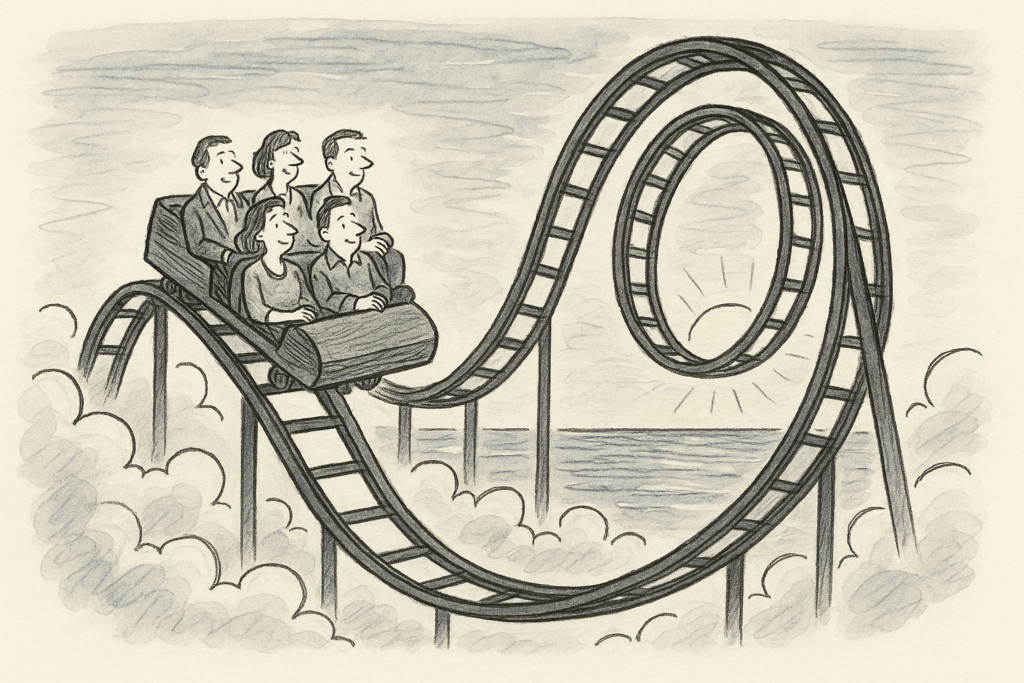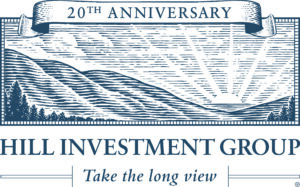Details Are Part of Our Difference
David Booth on How to Choose an Advisor
20 Years. 20 Lessons. Still Taking the Long View.
Making the Short List: Citywire Highlights Our Research-Driven Approach
The Tax Law Changed. Our Approach Hasn’t.
Tag: investment philosophy
20 Years. 20 Lessons. Still Taking the Long View.
What 20 Years Have Taught Us
Twenty years ago, we launched Hill Investment Group with a simple idea and a bit of idealism. We called our firm the Island of Idealism: a place where evidence mattered more than ego, long-term thinking trumped short-term noise, and clients could breathe a little easier knowing they had a guide they could trust.
That idealism is still with us. But over two decades, it’s been sharpened by experience. We’ve helped clients weather storms, tune out the headlines, and stay committed to plans built for decades, not days.
In the spirit of reflection, I reached out to my co-founder, Rick Hill, to help compile this list. Rick is now retired, but his thinking (and our friendship) continues to shape our work and HIG culture.
Here are 20 lessons we’ve learned in 20 years. Some are personal. Some are practical. All of them are built to last.
20 Lessons in 20 Years
1. Evidence beats emotion.
2. You don’t need to predict the future to build wealth. You need a process.
3. Costs, taxes, and behavior matter more than market forecasts.
4. Markets reward discipline, not cleverness.
5. Diversification is the only free lunch. Eat it every day.
6. A sound allocation only works if you stick with it. Education builds confidence, and confidence fuels discipline.
7. Our most successful clients are curious and engaged. They’re fun to work with, understand the philosophy, and like to delegate.
8. Listening is more powerful than convincing.
9. Trust is earned through credibility, reliability, and intimacy, not promised through performance.
10. Simplicity makes people feel smart. Complexity makes them feel confused. We care deeply about simplicity.
11. People want progress, not perfection.
12. Culture matters and should be tended like a garden.
13. High standards are contagious. So is apathy.
14. You don’t need to be big to be mighty.
15. The right people are worth the wait.
16. Saying no creates space for what matters.
17. Don’t check your portfolio when the world feels upside down. Check your plan.
18. The Stockdale Paradox applies to investing: Confront the facts, believe in the outcome. Untether from the short term.
19. Market volatility is normal. History proves it. You get paid for tolerating the bumpy ride.
20. Take the long view. It’s the only one that works.
Whether you’ve been with us since the early days or just recently joined the journey, thank you for trusting us. We’re proud of what we’ve built, and we’re even more excited about what’s ahead.
Still client-focused. Still evolving. Still taking the long view.
For your further exploration
- Hear the origin story: Matt & Rick on the “Island of Idealism”
- Read about it in Odds On: The Making of an Evidence-Based Investor
- ️Explore the Stockdale Paradox in this podcast episode
Signal vs. Noise: The Lakers, the Stock Market, and the Power of Clear Thinking

Welcome to the age of the “finfluencer.” While some have genuine experience, many are focused on views, and not your best interest. At Hill Investment Group, we believe that real advice should be simple, clear, and grounded in evidence, not hype. That’s why we’re launching a new series to unpack misleading ideas that circulate online or in print.
Our goal? To inform, not entertain. To offer substance, not speculation.
Heard something at work, at golf, or on social media that has you asking, “Should I be paying attention to this?” Feel free to share it with us. We’d love to help unpack it. Submissions will remain confidential unless we get your permission to share anonymously. Send to: zenz@hillinvestmentgroup.com
Please note: Submissions are reviewed for educational purposes only and do not constitute personalized investment advice.
A prominent advisor at a national wealth management firm recently posted a popular headline online:
“What could possibly have performed better than buying the Lakers for $67.5 million in 1979 and selling them for $10 billion today?
Answer: The stock market.”
The post argued that simply investing in the S&P 500 would have outperformed the sale of the Lakers by an estimated $3.7 billion.
It’s catchy. And it seems to reinforce a message we strongly believe in: that long-term, diversified investing often outperforms more exciting-sounding alternatives.
But there’s a problem: the comparison isn’t accurate.
The claim uses the total return of the S&P 500 (which includes both price appreciation and reinvested dividends) but compares it to only the price appreciation of the Lakers. That’s not an apples-to-apples comparison.
To make a fair comparison, we’d need to include decades of Lakers’ profits, as well as proceeds from the sale of other assets tied to the original deal, like the L.A. Kings, The Forum, and other valuable land holdings. A more appropriate benchmark for the S&P 500 would be its price return alone, which would have resulted in a significantly smaller figure than the Lakers’ current estimated value.
It’s like evaluating a stock without considering the dividends. As evidence-based investors, we know how important it is to look at the full picture.
Why Total Return Matters
At Hill, we focus on total return—not just income or price growth—because it reflects the complete investment outcome. Ignoring part of the return can lead to faulty comparisons and poor financial decisions.
So let’s not lose sight of the broader point: Owning a low-cost, globally diversified portfolio has been one of the most accessible and consistent wealth-building tools for long-term investors. Unlike a professional sports team, which typically requires billions in capital, an evidence-based portfolio is available to nearly anyone with savings and discipline.
Yes, buying the Lakers was a great investment for Jerry Buss.
But for the rest of us? Trusting markets, managing costs, and sticking to a thoughtful plan…that’s a powerful approach, too.
This example is for illustrative purposes only and does not reflect the performance of any specific investment or portfolio. Index performance is not indicative of any particular investment. It is not possible to invest directly in an index. Past performance does not guarantee future results.
A Timely Reminder to Keep Going
 Market volatility is back in the headlines, and if you’re feeling uneasy, you’re not alone. Over the past month, markets have given us another sharp reminder of what it means to be an investor. On April 2nd and 3rd, the S&P 500 fell a combined 10.7%—a drop that understandably triggered anxiety for some. And just when the idea of sitting on the sidelines might have felt tempting, the market turned on a dime. On April 9th, the S&P 500 gained 10.5% in a single day, quickly recapturing much of the prior decline.
Market volatility is back in the headlines, and if you’re feeling uneasy, you’re not alone. Over the past month, markets have given us another sharp reminder of what it means to be an investor. On April 2nd and 3rd, the S&P 500 fell a combined 10.7%—a drop that understandably triggered anxiety for some. And just when the idea of sitting on the sidelines might have felt tempting, the market turned on a dime. On April 9th, the S&P 500 gained 10.5% in a single day, quickly recapturing much of the prior decline.
That’s the market. It moves. Sometimes violently. In hourly bursts. Often unpredictably. And always in response to new information.
One of the best examples of this came on April 9th at 1:18 p.m. Eastern, when President Trump posted on Truth Social that he would lift tariffs on all countries other than China. Within ten minutes of that post, the S&P 500 had surged nearly 6%. Markets are incredibly efficient at digesting new information, whether it’s about trade policy, inflation, interest rates, or elections. The current price of a security reflects the consensus expectations of millions of participants, each with skin in the game.
So what should you do in the face of this kind of uncertainty?
Stick with your plan.
At Hill Investment Group, every client portfolio is built around a long-term strategy, not short-term noise. Your plan was designed with the understanding that markets will experience sharp moves, both up and down. We don’t pretend to know what tomorrow’s headlines will be or how the market will respond to them. What we do know—based on decades of data and mountains of research—is that markets are priced to deliver a positive expected return every single day. That’s why being in the market is so critical.
Missing just a handful of the best days has an outsized impact on long-term results. And as we just saw, those days often come immediately after the worst ones. Getting out and waiting “until the dust settles” may feel comforting, but it’s rarely profitable.
Global diversification is also part of the plan.
This year offers a good reminder of why. While the S&P 500 is down 9.7% year-to-date as of April 22nd, international developed and emerging markets are actually up 6.3%. No one can consistently predict which areas of the market will outperform in the short term. That’s why we build portfolios that don’t rely on a single country or asset class to deliver returns. Diversification ensures that when one area of the market struggles, others may pick up the slack. It’s not just about reducing risk—it’s about improving the odds of long-term success.
Instead of reacting to volatility, we encourage our clients to focus on what can be controlled—things that actually add value:
- Tax Loss Harvesting – When markets decline, we actively harvest losses to offset gains elsewhere in your portfolio. This reduces your tax bill while keeping you invested.
- Rebalancing – We monitor portfolios to ensure your exposure to risk remains aligned with your plan, buying when assets are down and trimming when they’ve run up.
- Staying the Course – Most importantly, we help you stay focused on the big picture. Financial goals aren’t achieved in a week or a month—they’re met over years and decades by maintaining discipline and a long-term perspective.
Trying to respond to every market move or every tweet is not an investment strategy. It’s gambling. It’s a recipe for regret.
So yes, volatility has returned. And no, we can’t predict what comes next. But we can control how we respond. And our response is grounded in evidence, backed by decades of research, and aligned with your goals.
We’re here to help you take the long view. That’s not just a tagline—it’s a philosophy that has helped our clients build and preserve wealth through all kinds of markets. And it’s one we continue to believe in today.
Stick with it.
Hill Investment Group is a registered investment adviser. Registration of an Investment Advisor does not imply any level of skill or training. This information is educational and does not intend to make an offer for the sale of any specific securities, investments, or strategies. Investments involve risk, and past performance is not indicative of future performance.


